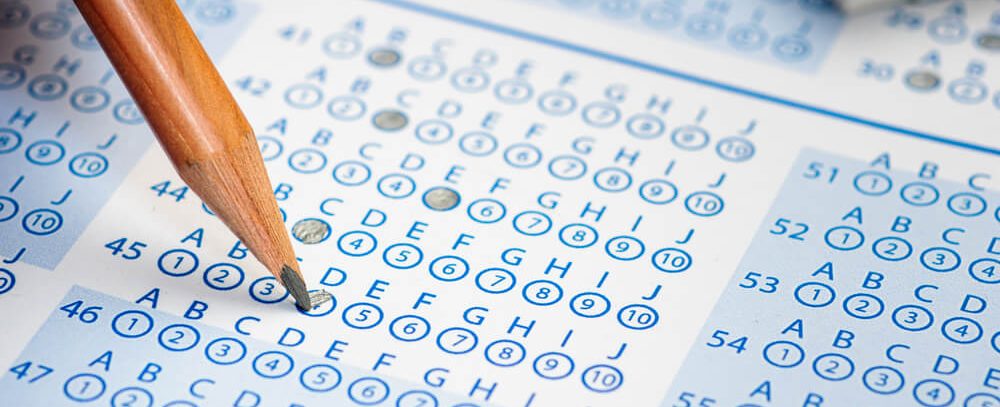Student-centric advice and objective recommendations
Higher education has never been more confusing or expensive. Our goal is to help you navigate the very big decisions related to higher ed with objective information and expert advice. Each piece of content on the site is original, based on extensive research, and reviewed by multiple editors, including a subject matter expert. This ensures that all of our content is up-to-date, useful, accurate, and thorough.
Our reviews and recommendations are based on extensive research, testing, and feedback. We may receive commission from links on our website, but that doesn’t affect our editors’ opinions. Our marketing partners don’t review, approve or endorse our editorial content. It’s accurate to the best of our knowledge when posted. You can find a complete list of our partners here.
What is the ISEE?
 By
Cece Gilmore
By
Cece Gilmore 
Cece Gilmore is a Content Writer at Scholarships360. Cece earned her undergraduate degree in Journalism and Mass Communications from Arizona State University. While at ASU, she was the education editor as well as a published staff reporter at Downtown Devil. Cece was also the co-host of her own radio show on Blaze Radio ASU.
Full BioLearn about our editorial policies

Cari Schultz is an Educational Review Board Advisor at Scholarships360, where she reviews content featured on the site. For over 20 years, Cari has worked in college admissions (Baldwin Wallace University, The Ohio State University, University of Kentucky) and as a college counselor (Columbus School for Girls).
Full BioLearn about our editorial policies

Maria Geiger is Director of Content at Scholarships360. She is a former online educational technology instructor and adjunct writing instructor. In addition to education reform, Maria’s interests include viewpoint diversity, blended/flipped learning, digital communication, and integrating media/web tools into the curriculum to better facilitate student engagement. Maria earned both a B.A. and an M.A. in English Literature from Monmouth University, an M. Ed. in Education from Monmouth University, and a Virtual Online Teaching Certificate (VOLT) from the University of Pennsylvania.
Full BioLearn about our editorial policies

The Independent School Entrance Examination, familiarly known as the ISEE, is used for entrance to private middle and high schools. Over 1,200 independent schools around the world accept the ISEE. Read more about exactly what the ISEE is, who it is designed for, what topics it covers, how it’s formatted, and how it is scored in our guide below!
Why take the ISEE?
Before diving into what exactly the ISEE is, it is important to understand why someone might take the test. The exam is required by a majority of private middle and high schools across the country. It is simply one piece of the application for admittance to a private school.
What exactly is the ISEE?
The ISEE tests students abilities on the following topics:
- Verbal reasoning
- Quantitative reasoning
- Reading comprehension
- Math achievement
- Writing/essay
The test is designed for students in grades 2 to 11. It has four levels of tests that correspond to the grade level the test taker is currently in.
What are the different grade levels that can take the ISEE?
The ISEE has four levels for students to take dependent on their current year in school:
- Primary level – for students who are currently in grades 2 through 4
- Lower level – for students who are currently in grades 5 and 6
- Middle level – for students who are currently in grades 7 and 8
- Upper level – for students who are currently in grades 9 through 12
Once a student has taken the correct exam for their grade level, and hopefully has been admitted to the desired private school, they do not have to retake the test unless they want to attend a different private school.
Sections of the ISEE
The sections of the ISEE can be broken down into the same five sections regardless of which level the test taker is matched to. This includes the following:
- Verbal reasoning – tests vocabulary and sentence recognition
- Quantitative reasoning – tests math concepts and reasoning
- Reading comprehension – tests reading comprehension by asking questions related to a passage
- Math achievement – tests fundamental math skills typically through decimals, fractions, and percentages
- Writing/essay – tests writing skills by asking students to write a short personal essay
It is important to note that the essay section of the ISEE is not scored. However, it is sent to the school to which the test taker applies to, and can be read by the admissions team. Therefore, it is still important to do well on the essay portion in case the school takes it into consideration for admission.
ISEE Formatting by level
Primary level ISEE format
There are three versions of the primary level ISEE:
- Primary 2 – for students applying to 2nd grade
- Primary 3 – for students applying to 3rd grade
- Primary 4 – for students applying to 4th grade
Primary 2 ISEE format
| Section | Number of Questions | Time permitted |
| Auditory comprehension | 6 | 7 minutes |
| Reading | 18 | 20 minutes |
| Break | – | 5 minutes |
| Mathematics | 24 | 26 minutes |
Primary 3 ISEE format
| Section | Number of Questions | Time permitted |
| Reading | 28 | 30 minutes |
| Break | – | 5 minutes |
| Mathematics | 28 | 30 minutes |
Primary 4 ISEE format
| Section | Number of Questions | Time permitted |
| Reading | 28 | 30 minutes |
| Break | – | 5 minutes |
| Mathematics | 28 | 30 minutes |
About each primary level ISEE section
Auditory Comprehension section
- Listen to a passage
- Listen and view the questions
- Questions about main idea, organization, vocabulary and tone of passage
Reading section
- Read a passage
- Asked questions about main idea, organization, vocabulary and tone
Mathematics section
- Algebraic concepts
- Data analysis and probability
- Geometric concepts
- Measurement
- Number sense and operations
- Calculators are not allowed
Don’t miss: What is a Montessori school?
Lower level ISEE format
The lower level ISEE exam is for students applying for entrance to 5th or 6th grade.
| Section | Number of Questions | Time permitted |
| Verbal reasoning | 34 | 20 minutes |
| Quantitative reasoning | 38 | 35 minutes |
| Reading comprehension | 25 | 25 minutes |
| Mathematics achievement | 30 | 30 minutes |
| Essay | 1 | 30 minutes |
About each lower level section
Verbal reasoning section
- Synonym questions
- Sentence completion questions
Quantitative reasoning
- Problem solving skills
- Critical thinking
- Mathematical questions
Reading comprehension
- Five reading passages
- Main idea
- Organization
- Vocabulary
- Tone
Mathematics achievement
- Algebraic concepts
- Data analysis and probability
- Decimals, percents, and fractions
- Geometry
- Measurement
- Whole numbers
Essay
- Respond to a personal writing prompt
- Gives you the chance to share something about yourself
Middle and Upper level ISEE format
The middle level ISEE exam is for students applying for entrance to 7th or 8th grade. The upper level ISEE exam is for students applying for entrance to 9th, 10th, 11th or 12th grade.
| Section | Number of Questions | Time permitted |
| Verbal reasoning | 40 | 20 minutes |
| Quantitative reasoning | 37 | 35 minutes |
| Reading comprehension | 36 | 35 minutes |
| Mathematics achievement | 47 | 40 minutes |
| Essay | 1 | 30 minutes |
About each middle/upper level ISEE section
Verbal reasoning section
- Synonym questions
- Sentence completion questions
Quantitative reasoning
- Algebraic concepts
- Data analysis and probability
- Geometry
- Measurement
- Number sense
- Quantitative comparison
Reading comprehension
- Six reading passages
- Main idea
- Supporting ideas
- Organization
- Vocabulary
- Tone
Mathematics achievement
- Algebraic concepts
- Data analysis and probability
- Decimals, percents, and fractions
- Geometry
- Measurement
- Whole numbers
Essay
- Respond to a personal writing prompt
- Gives you the chance to share something about yourself
Also see: Private vs. public K12: What to consider
How is the ISEE scored?
The raw score on the ISEE is determined by the number of questions answered correctly. The exam does not have a “wrong answer” penalty. Therefore, students should always guess and never leave a question unanswered. The test-taker will receive a grade report after taking the test. This report will include multiple sets of scores and percentiles.
Scaled score
The raw score for every section is converted into a scaled score.
Verbal Reasoning
- 797-935 (Upper Level)
- 782-926 (Middle Level)
- 760-903 (Lower Level)
- 200-299 (Primary Level)
Quantitative Reasoning
- 815-940 (Upper Level)
- 791-927 (Middle Level)
- 766-911 (Lower Level)
- 200-299 (Primary Level)
Reading Comprehension
- 825-940 (Upper Level)
- 799-940 (Middle Level)
- 764-913 (Lower Level)
- 200-299 (Primary Level)
Mathematics Achievement
- 806-940 (Upper Level)
- 774-907 (Middle Level)
- 769-899 (Lower Level)
- 200-299 (Primary Level)
Percentile score
Schools receive a percentile score in addition to the scaled score. The percentile score assesses how the student did compared to other students. The percentile score is based on a 3-year rolling pool of applicants in the same grade regardless of gender.
Also see: How to prepare for the SSAT
How to sign up for the exam
Prior to signing up for the ISEE, make sure you know which level of test you need!
A quick recap of the test levels:
- Primary levels 2/3/4 – for students entering 2nd, 3rd or 4th grade
- Lower level – for students entering 5th or 6th grade
- Middle level – for students entering 7th or 8th grade
- Upper level – for students entering 9th, 10th, 11th or 12th grade
ISEE testing seasons
The ISEE offers testing dates throughout the year. However, students can only take the exam one time per testing season. There are 3 testing seasons:
- Fall – August to November
- Winter – December to March
- Spring/Summer – April to July
ISEE testing locations
The ISEE exam is offered in 4 different types of venues:
- Group testing at a school
- Group or individual testing at an ISEE testing center
- Small group testing at a prometric testing center
- Individual testing at home
Related: ISEE vs SSAT: Which should I take?
How to officially register for the ISEE
Once figuring out which testing season and location works best for your situation – it is now time to officially register! Follow the steps below to register for the ISEE:
- Visit the official Admission Registration website and create an account
- Create a parent and student profile
- Register for an exam testing date
Don’t miss: What is a good SSAT score?


